Abstract
Europe, 2019. It appears that right-wing populists are on the rise in many countries. However, is it possible to compare these parties between countries? What do they have in common? How do they differ? What is the general political orientation on controversial themes in different countries? What is the position of the leading politicians on these themes? Is ‘Alternative for Germany’ similar to ‘Lega Nord’?
Therefore, we will take a short journey through the different political topics. For this purpose, we will focus on some of the largest countries in the European Union: France, Germany, Italy, Spain and Poland.
Taking into account the quotes and the party of politicians, we will examine and compare the hottest topics in each country.
Besides, we will investigate how politicians from different countries position themselves over the same topics, especially if they come from the same political background (i.e. right parties).
More precise: our research questions
- How much does the political scenario in some hot topics (for example immigration, climate change, EU, discrimination, Israeli-Palestinian conflict, Russia, terrorism and Covid-19) change from one country to another? Why is that?
- Considering the most important parties of these countries, how much do their opinions and interest differ over these topics?
- How do the important politicians of the right-wing parties position themselves over the same topics? What can we observe if we compare them with the heads of government in the same countries?
Topic selection
We decided to examine the situation of each country in the following topics:
- Immigration
- European Union and Brexit
- Discrimination (racism, based on gender, homophobia)
- Israeli-Palestinian conflict
- Russia and Putin
- COVID-19
- Terrorism
Due to a lack of data, we will not analyze the COVID-19 topic specifically for the first part.
Immigration
Let’s start our journey by taking a look into one of the most controvers discussed topic in the European countries, the immigration theme. How did it develop over time?
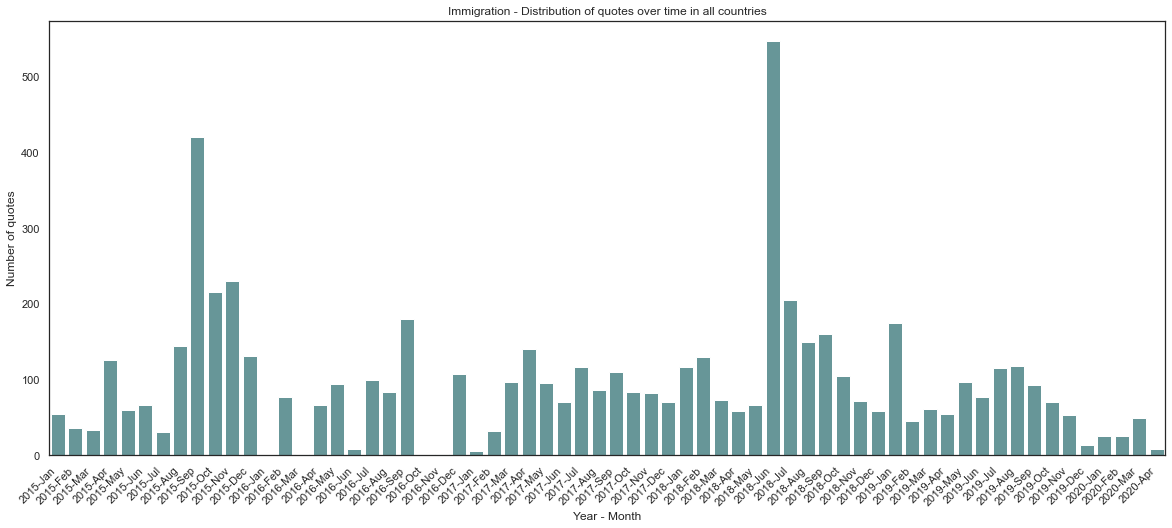
First, you may have noticed that on average there are fewer citations in the colder months. The reason for this is that migrants prefer to take advantage of better weather and therefore their number rises in warmer months. Second, you can see 2 clear peaks. It seems that immigration made headlines in September 2015 and June 2018. What happened in these months? To get an answer to this question, let’s look at the distribution w.r.t each country. The peaks distinguish quite a lot in each country:
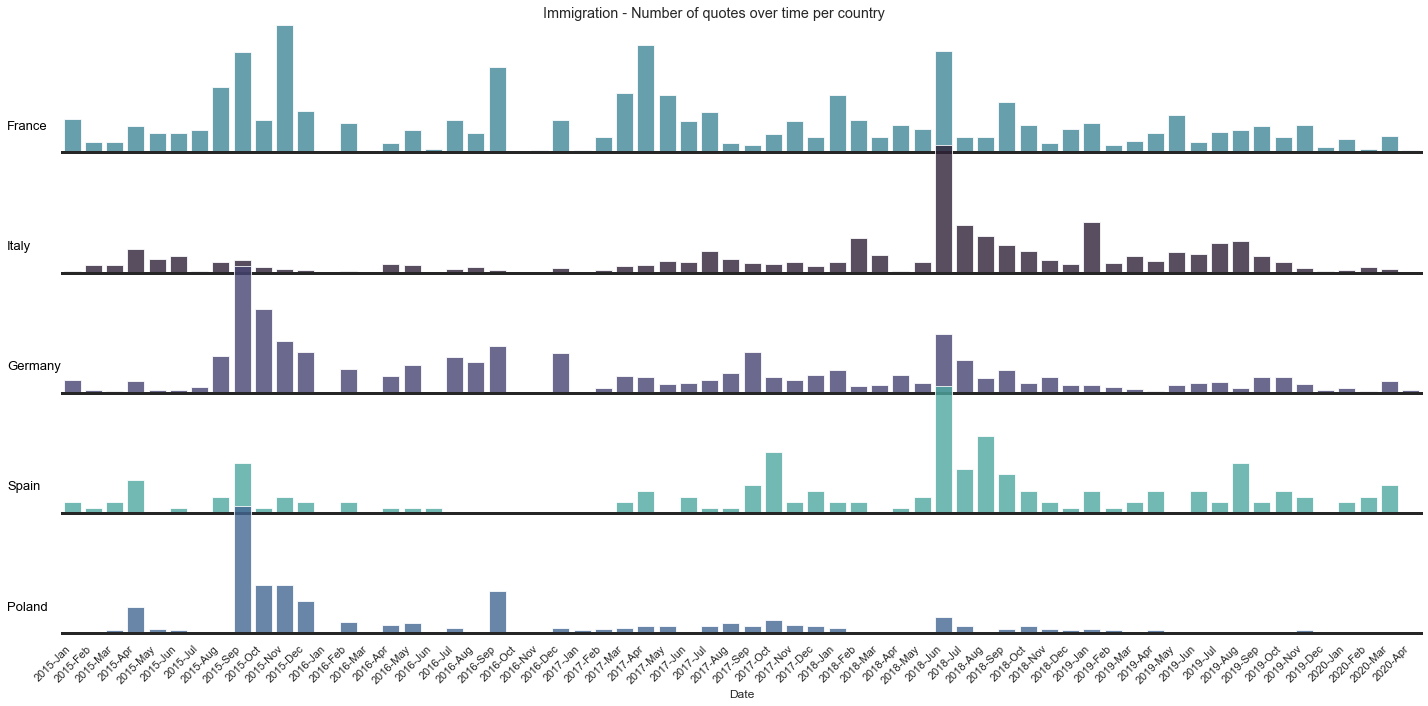
September 2015
Let’s start with the situation in 2015. In 2015, the main route shifted from the dangerous Mediterranean, crossing from Libya to Italy, to another one crossing from Turkey to Greek islands like Lesvos, what would prove to be even deadlier. This explains why the peak is completely absent in Italy’s point of view and, on the other hand, is quite marked in Germany or Poland. Over 75% of those arriving in Europe had fled conflict and persecution in Syria, Afghanistan or Iraq.
The peak on this month can be sadly explained by a drammatic event that took place on 2 September 2015. On this day, Alan Kurdi, a three-years-old Syrian boy, lost his life trying to reach Europe from Turkey. The photo of his body laying on a beach in Turkey moved millions worldwide.
By the time Aylan’s body washed ashore, more than 300,000 people had risked their lives to reach Europe. Over 2,600 had perished in the attempt.
June 2018 and Matteo Salvini
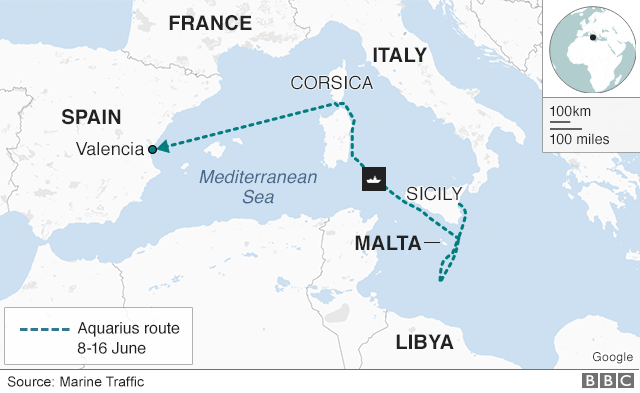
At first glance, the peak in June 2018 is clearly caused by Italy and, most likely, by the most popular speaker in the immigration topic, Matteo Salvini. However, this huge crest could be quite weird by just looking at data. The number of migrants in 2018 is quite low if compared to the figures of the previous years.
However, something happened in Italian politics during these days. Indeed, Matteo Salvini, leader of the far-right party “Lega Nord”, was sworn in as Deputy Prime Minister and Minister of the Interior on 1 June 2018. He immediately started with his main aim to drastically reduce the number of illegal immigrants to Italy.
On 10 June 2018, Salvini, who is also the person with the most quotes in immigration (see plot below), announced the closure of Italian ports. The vessel Aquarius, which carried more than 600 migrants, was refused a port of disembarkation by the Italian authorities. It was accepted by Spanish authorities, and it finally arrived at the Port of Valencia on 17 June 2018.
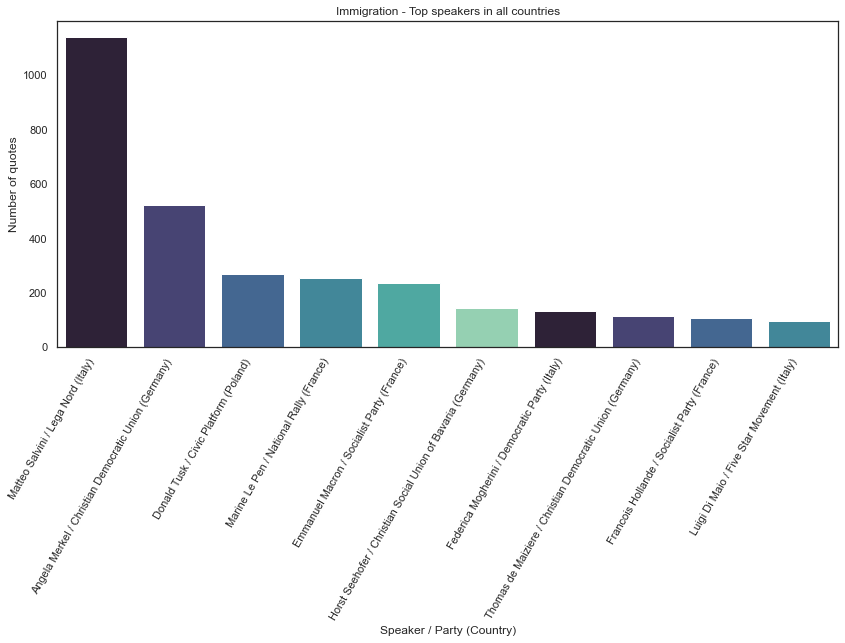
References:
European Union and Brexit
This time we will start our analysis from the most popular speakers:
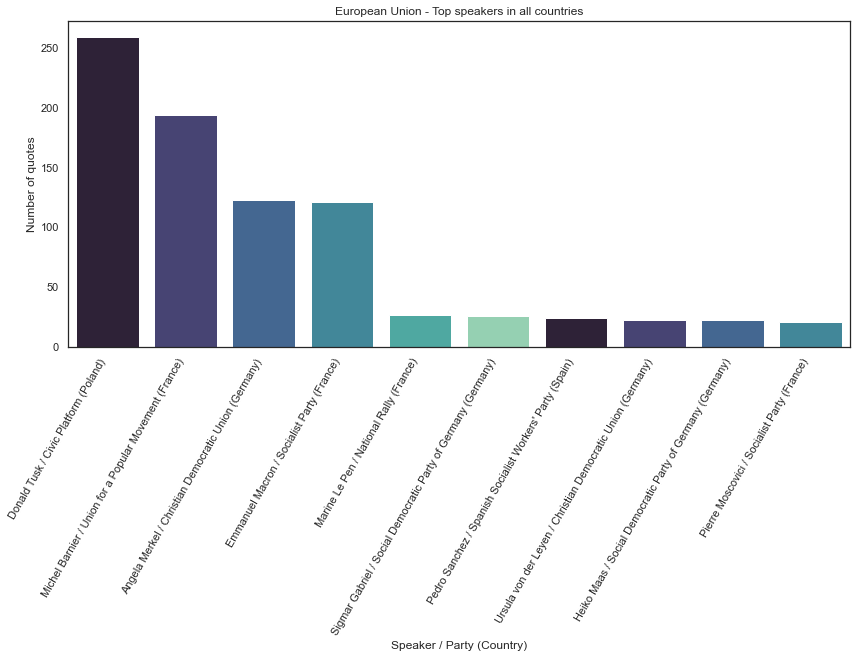
We can see, indeed, that there are eminent European politicians:
- Donald Tusk (President of the European Council from 2014 to 2019)
- Michel Barnier (Former European Commissioner for Cohesion and Reforms)
- Pierre Moscovici (Former European Commissioner for Economic and Financial Affairs, Taxation and Customs).
- Ursula von der Leyen (President of the European Commission)
How was the distribution of the number of quotes per country?
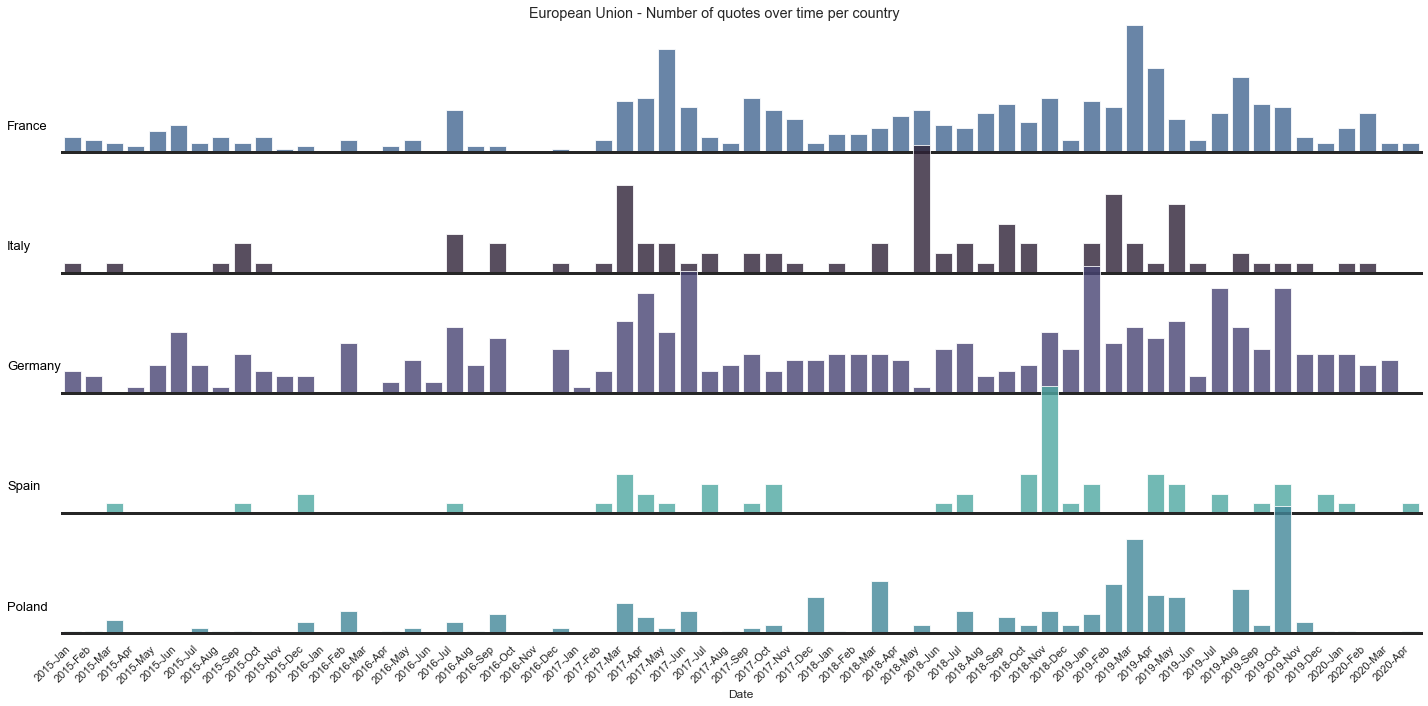
As we will see, the peaks correspond to important events of Brexit, the withdrawal of the United Kingdom from the European Union.
March 2017

On 29 March 2017, the United Kingdom invoked Article 50 of the Treaty on European Union which began the member state’s withdrawal from the European Union.
In compliance with the TEU, the UK gave formal notice to the European Council of its intention to withdraw from the EU to allow withdrawal negotiations to begin.
March 2019
The UK had long been expected to leave the European Union at 11pm on 29 March 2019. However, following a House of Commons vote on 14 March 2019, the government sought permission from the EU to extend Article 50 and agree a later Brexit date.
On 20 March 2019 the Prime Minister, Theresa May, wrote to European Council President Donald Tusk, asking to extend Article 50 until 30 June 2019.
October 2019
In the run-up to the scheduled date for the UK’s departure at Halloween, Boris Johnson’s government finally sealed a new exit deal with the EU – but a missed deadline in the British parliament forced the prime minister by law to seek another Brexit delay.
European leaders agreed to the request for a three-month extension, while UK lawmakers finally agreed to an early general election in December to try to clear the path ahead.
Discrimination
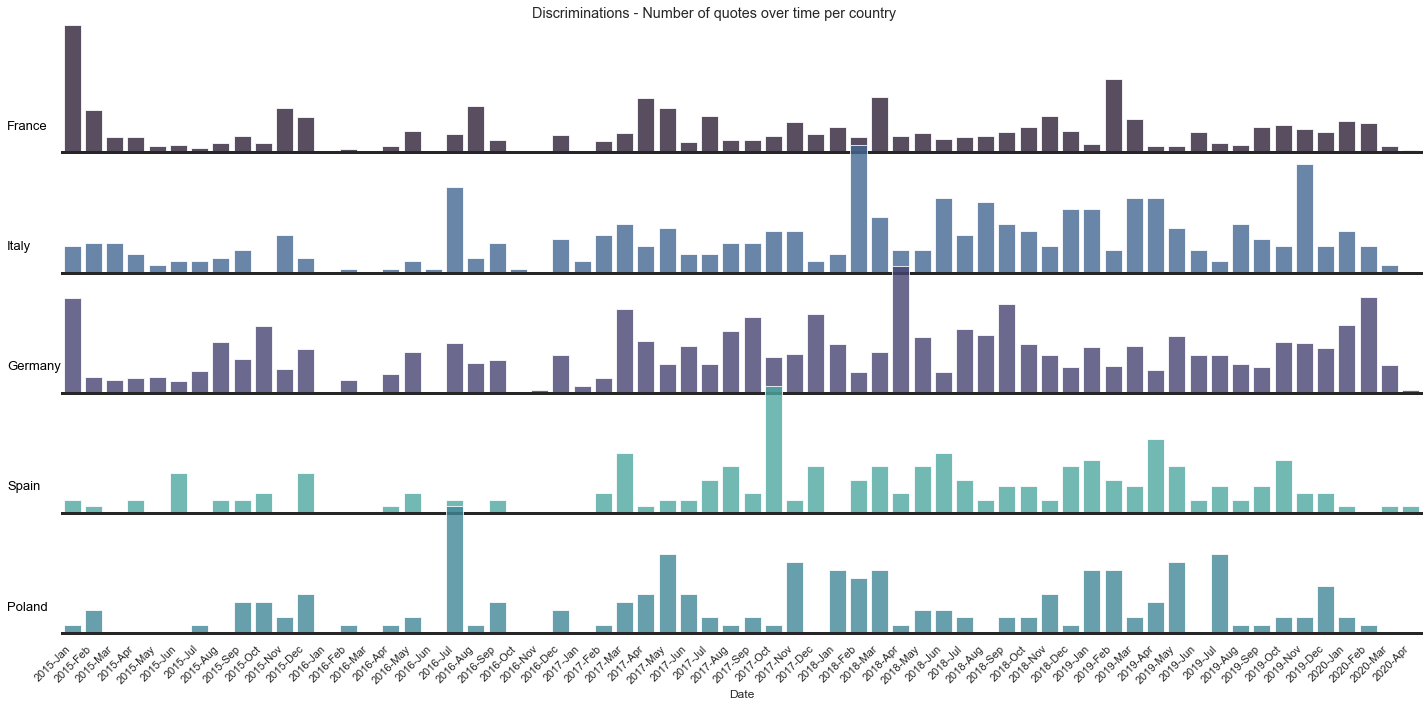
First, we can observe a huge peak in France January 2015. In addition, there are a few more peaks, more accentuated in the countries distributions.
January 2015
The most important peak is linked to the Islamic terrorism attacks of the same month in France.
It is also an important event for discriminations. The former President of France, Hollande, affirmed that radical Islam had fed off contradictions, poverty, inequality and conflict, and that “it is Muslims who are the first victims of fanaticism, fundamentalism and intolerance”.
He also added that “French Muslims have the same rights as all other French […]. We have the obligation to protect them. […] Anti-Muslim and anti-Semitic acts have to be condemned and punished.”
July 2016
As in the last case, the peak is mainly because of Donald Tusk’s statements on Nice terrorism attack. In fact, he affirmed that the “subjects of the attack were people celebrating liberty, equality and fraternity”.
March 2017
This peak can be linked to the third top speaker: Thomas Bach, President of the International Olympic Committee. In fact, the International Olympic Committee (IOC) Executive Board on this day approved a major review project regarding gender equality in the Olympic Movement.
October 2017
This time the main term is “liberty”. In fact, in October 2017, the Catalan independence referendum took place.
February 2018
On 3 February 2018, in the city of Macerata, Marche, 28-year-old local Luca Traini seriously wounded in a drive-by shooting six African migrants. After the attack, Traini reportedly had an Italian flag draped on his shoulders and raised his arm in a Fascist salute.
Traini said the attack was revenge for the murder of Pamela Mastropietro, an 18-year-old local girl whose dismembered body had been found a few days earlier, stuffed into two suitcases and dumped in the countryside. For this, a 29-year-old Nigerian national and failed asylum seeker, Innocent Oseghale, had been arrested and charged.
April 2018
On 17 April 2018, Adam Armoush, a 21-year-old Israeli Arab living in Berlin and his German friend of Moroccan origin went through a street in Prenzlauer Berg taking selfies while wearing kippahs.
At one point, an argument with three Arab-speaking young men started, which was followed by a violent attack. Armoush managed to document the violence with his cell phone and later allowed the video to be shared on Facebook, from where the video went viral.
The video shows the main attacker beat Armoush repeatedly with his belt. During the onslaught, the attacker shouted the word “Yahudi”, the Arabic word for Jew, before one his companions intervened and dragged him away.
References:
- France to protect all religions, vows Francois Hollande
- IOC launches bold initiative on gender equality
- Macerata shooting
- 2018 Berlin anti-semitic attack
Israeli - Palestinian conflict
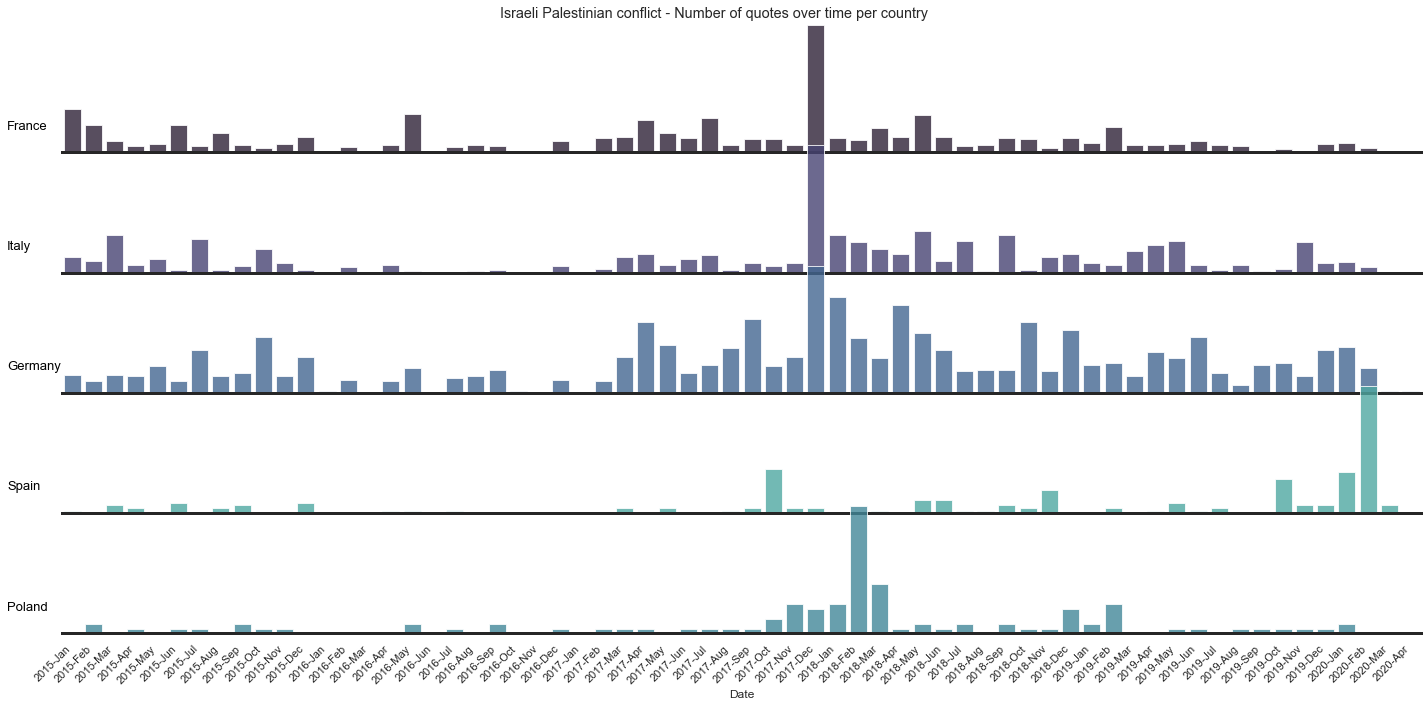
First, we can observe that this topic was mainly discussed in the month of December 2017.
December 2017

This peak was caused by something that, actually, happened in the USA: President Donald Trump has announced that the US recognises Jerusalem as Israel’s capital, overturning decades of official US policy.
The fate of the ancient city is one of the thorniest issues between Israel and the Palestinians. Israel called Mr Trump’s move “historic” but there has been sharp international criticism. Palestinian President Mahmoud Abbas called Mr Trump’s announcement “deplorable”, saying the US could no longer be a peace broker.
The decision to recognise Jerusalem as Israel’s capital puts the US at odds with the rest of the international community’s view on Jerusalem’s status.
February 2018
This time, the peak is more about one of the two countries: Israel. On 6 February 2018, the President of Poland signed an amendment to the Law on the Institute of National Remembrance, which makes it a crime to publicly claim that Poland had any responsibility for or complicity in the Holocaust.
The law met with widespread international criticism, as it was seen as an infringement on freedom of expression and on academic freedom, and as a barrier to open discussion on Polish collaborationism, in what has been described as “the biggest diplomatic crisis in Poland’s recent history”.
February 2020
On 23 February 2020, European foreign policy chief, the Spanish Josep Borrell, has criticized Israel’s announced plans to build a new neighborhood in East Jerusalem and expand another, warning such action “would be deeply detrimental to a two-state-solution.”
He said the European Union would not recognize any changes to Israel’s pre-1967 borders and urged Jerusalem to reconsider its plan.
He also appears in our top speakers ranking for this topic:
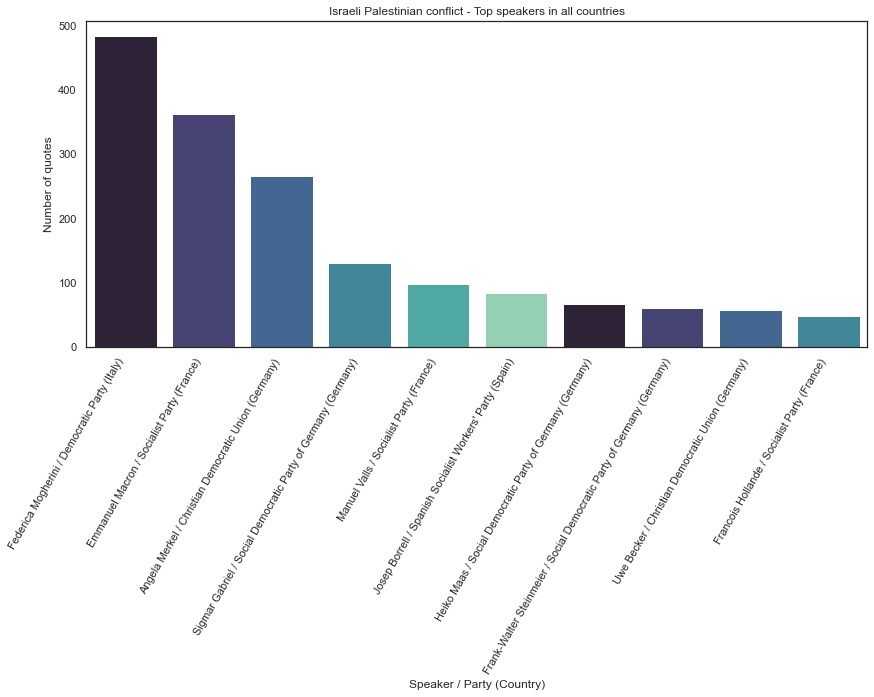
References:
- Jerusalem is Israel’s capital, says Donald Trump
- Poland: The Law on the Institute of National Remembrance contravenes the right to freedom of expression
- Amendment to the Act on the Institute of National Remembrance
- EU calls Netanyahu’s plans for East Jerusalem construction ‘deeply detrimental’
Climate change
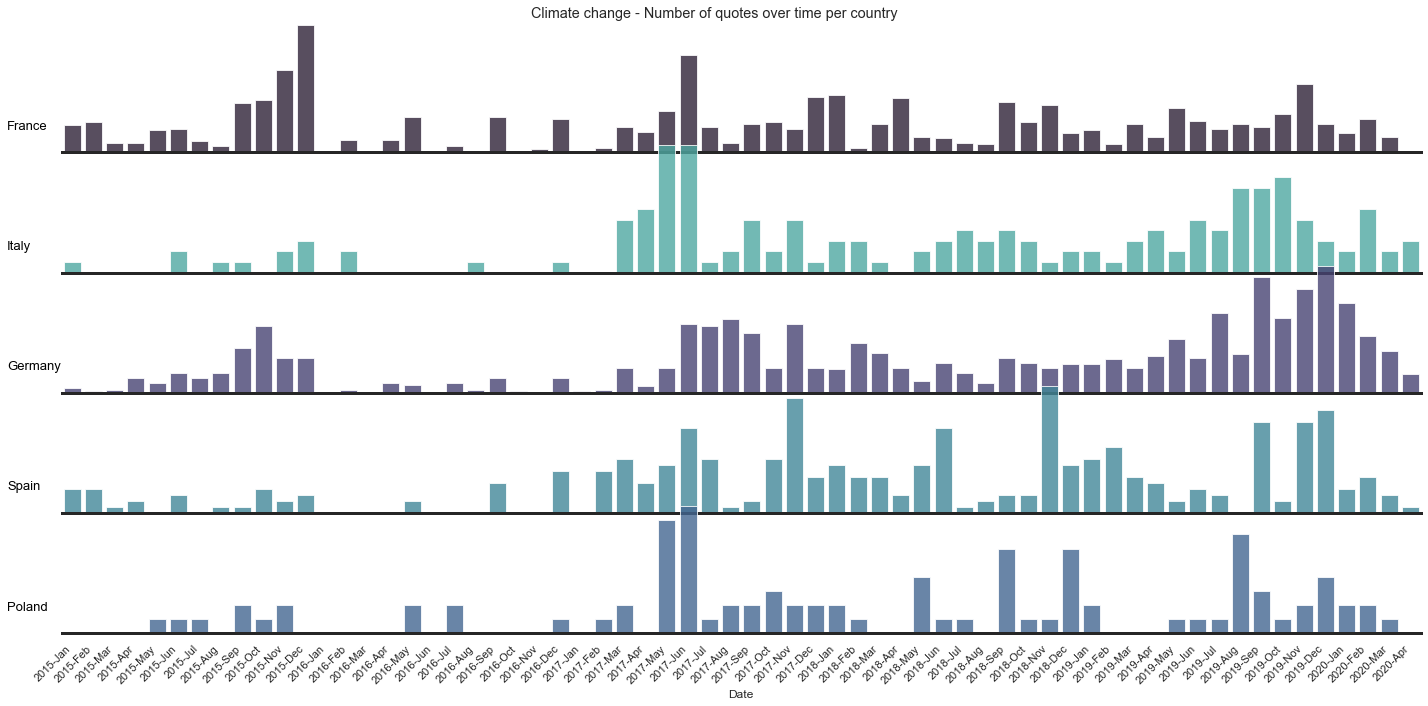
We can see that this time the distribution in all the countries look alike.
There are a few important peaks. The peak in France in December 2016. There are peaks for all countries in June 2017. The last one is in Germany in December 2019.
December 2015

To tackle climate change and its negative impacts, world leaders at the UN Climate Change Conference (COP21) in Paris reached a breakthrough on 12 December 2015: the historic Paris Agreement. This also explains the reason why this peak is particularly pronounced in France.
The central objective of the Paris Agreement is to limit global warming to well below 2, preferably to 1.5 degrees Celsius, compared to pre-industrial levels.
To achieve this long-term temperature goal, countries aim to reach global peaking of greenhouse gas emissions as soon as possible to achieve a climate neutral world by mid-century.
June 2017
On June 1, 2017, United States President Donald Trump announced that the U.S. would cease all participation in the 2015 Paris Agreement on climate change mitigation, contending that the agreement would “undermine” the U.S. economy, and put the U.S. “at a permanent disadvantage.”
December 2019
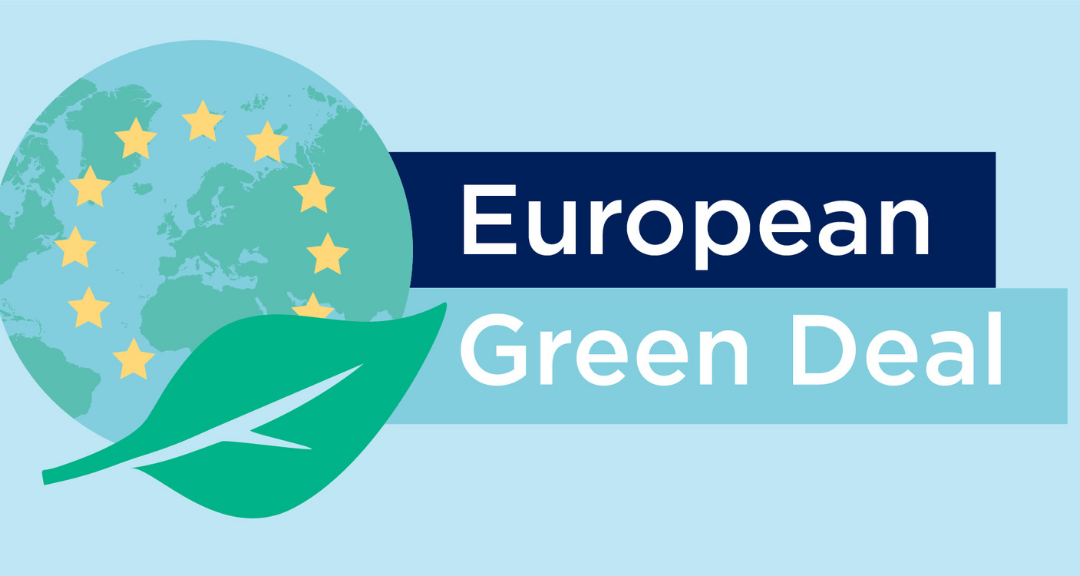
The Commission’s President Ursula von der Leyen presented on 11 December 2019 the European Green Deal, a plan to make Europe the first climate-neutral continent by 2050.
The Green Deal is a new growth strategy to make the EU’s economy sustainable and create sustainable industry and transport.
The fact that the main actor of this event was Ursula von der Leyen, explains why the peak is more acute in the German distribution.
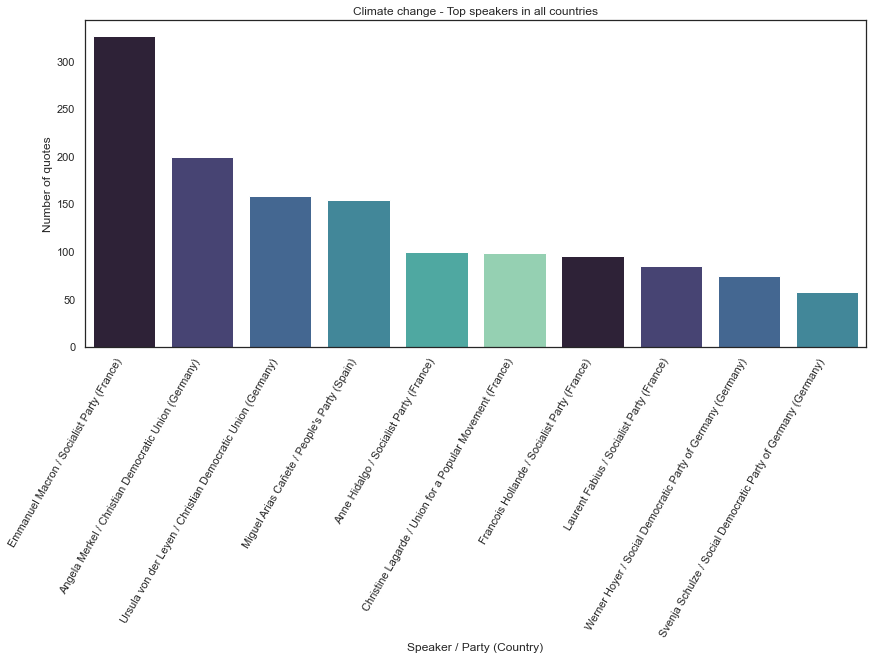
References:
- The Paris Agreement
- The Paris Agreement
- United States withdrawal from the Paris Agreement
- THE EUROPEAN GREEN DEAL
Terrorism
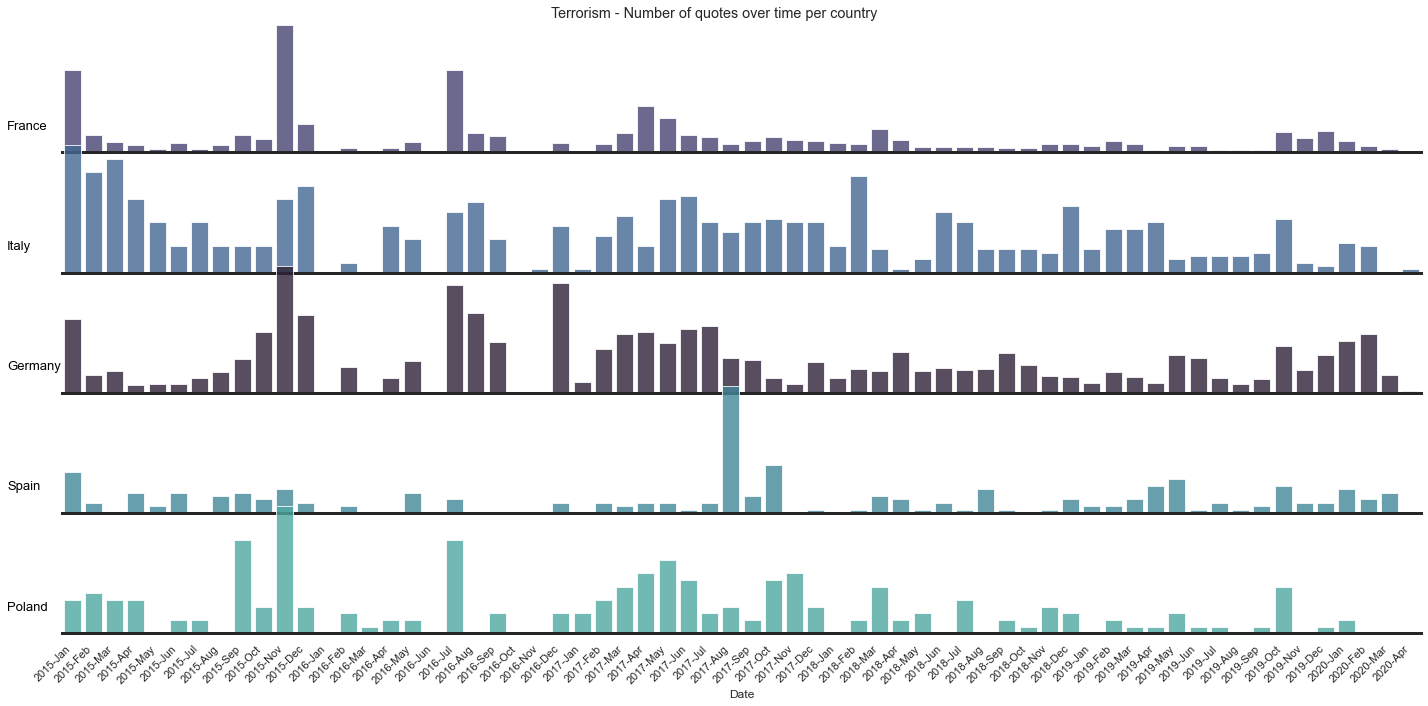
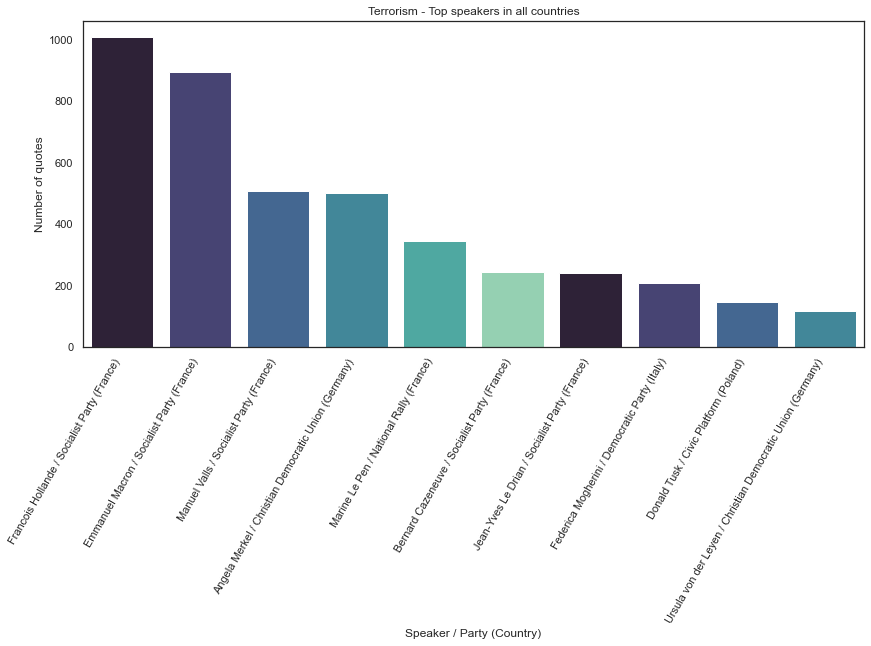
The first tragic aspect to note in this topic is that the most quoted speakers are French. This is clearly related to the particular gravity of the terrorism problem in France.
In addition, we can notice that Italy has no big peaks as it has never been targeted by attacks. The same could be said about Poland, but Donald Tusk, who is Polish, happened to be the President of the European Council during these events.
On the other hand, Spain has a peak (August 2017) that it is not shared with the other countries. This is also the case for Germany, in December 2016.
Therefore, we will analyse the three biggest peaks, January 2015, November 2015 and July 2016, as well as the Spanish and German ones.
January 2015

From 7 to 9 January 2015, terrorist attacks occurred across the Île-de-France region, particularly in Paris. Three attackers killed a total of 17 in four shooting attacks, before they were killed by the police.
The most renowned is the first one: on 7 January, two gunmen attacked the headquarters of the satirical newspaper Charlie Hebdo, killing 12 people and wounding 12 others before escaping.
November 2015
On 13 November 2015, a series of coordinated Islamist terrorist attacks took place in Paris:
- Three suicide bombers struck outside the Stade de France in Saint-Denis, during an international football match, after failing to gain entry to the stadium.
- Another group of attackers then fired on crowded cafés and restaurants in Paris, with one of them also blowing himself up.
- A third group carried out another mass shooting and took hostages at a rock concert attended by 1,500 people in the Bataclan theatre.
The attackers killed 130 people, including 90 at the Bataclan theatre. Another 416 people were injured, almost 100 critically.
July 2016
On the evening of 14 July 2016, a 19-tonne cargo truck was deliberately driven into crowds of people celebrating Bastille Day on the Promenade des Anglais in Nice, France, resulting in the deaths of 86 people and the injury of 458 others.
December 2016

On 19 December 2016, an unsuccessful asylum seeker from Tunisia drove a stolen truck through a Christmas market at Breitscheidplatz in the City West of Berlin, killing 11 people and injuring 56.
The incident is the deadliest terrorist attack in Germany since an attack at Oktoberfest in Munich in 1980.
August 2017
On the afternoon of 17 August 2017, 22-year-old Younes Abouyaaqoub drove a van into pedestrians on La Rambla in Barcelona, Catalonia, Spain killing 13 people and injuring at least 130 others, one of whom died 10 days later on 27 August. Abouyaaqoub fled the attack on foot, then killed another person in order to steal the victim’s car to make his escape.
Nine hours after the Barcelona attack, five men thought to be members of the same terrorist cell drove into pedestrians in nearby Cambrils, killing one woman and injuring six others.
References:
- January 2015 Île-de-France attacks
- November 2015 Paris attacks
- 2016 Nice truck attack
- 2016 Berlin truck attack
- 2017 Barcelona attacks
Most popular topics per country
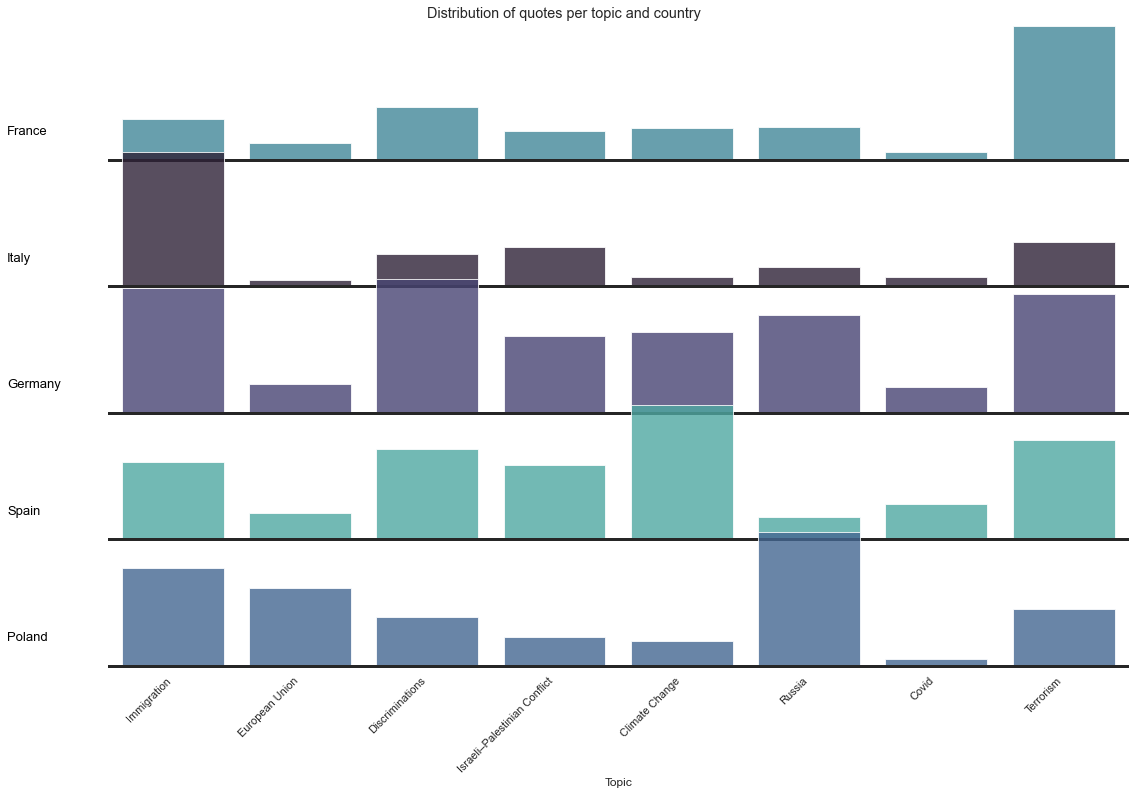
All the previous explanations naturally suggest what we can see from this image:
- the most important topic in France is terrorism, as the country was the target of many attacks.
- in Italy, immigration is the most popular topic. This is because of the European migrant crisis and of the favourable geographical position of Italy.
- Germany, as well as Spain, do not have remarkably more popular topics. Indeed, for example, both countries faced the problems of immigration and were target of terrorists.
One difference could be that, in Spain, the Russia topic was much less important than in Germany, probably because of the key roles of German politicians in the relation between EU and Russia. - in Poland, the European Union / Brexit and Russia topics were the most important ones. This could be explained by the key importance of the Polish politician Donald Tusk, Former President of the European Council, in these topics because of his role.
How do the opinions of these parties differ on the selected topics?
Now we will examine how much the opinions of a party from one country differ compared to a party from another country for our sepcific topics. Let us first take a look which parties we will consider by plotting the parties for each country w.r.t. the number of quotes:
| Germany | France |
|---|---|
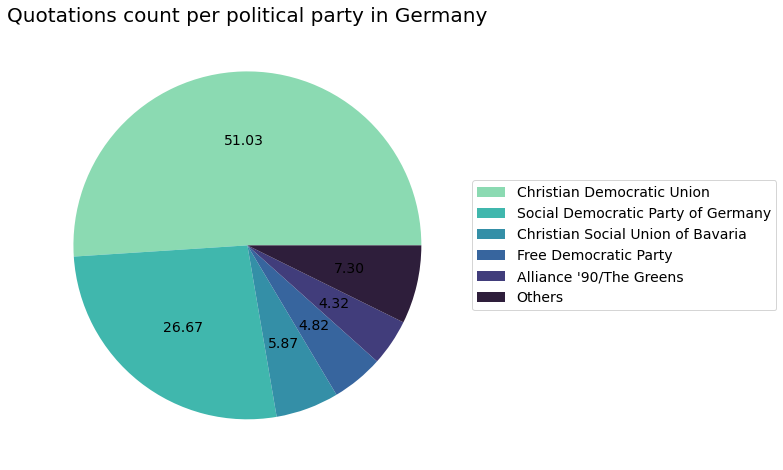 |
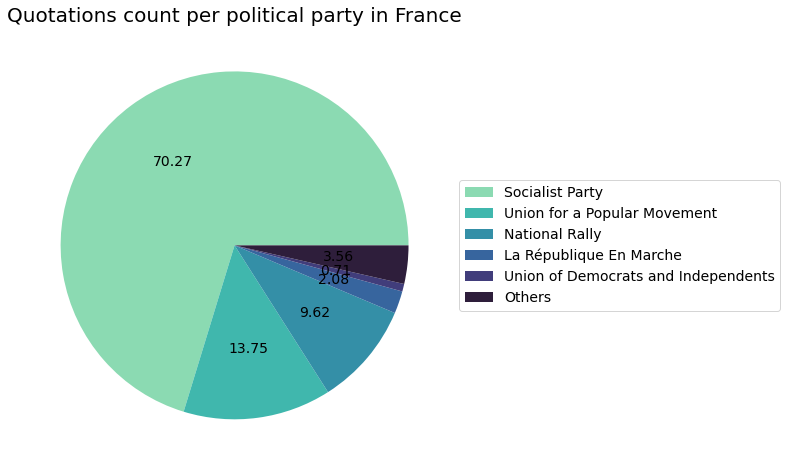 |
| Italy | Poland |
|---|---|
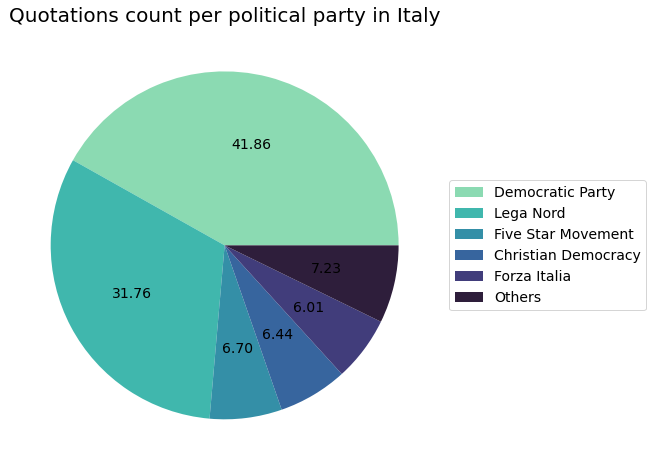 |
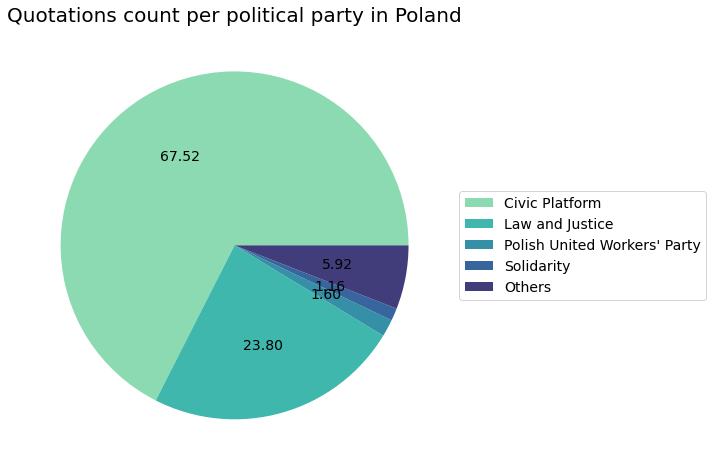 |
| Spain | |
|---|---|
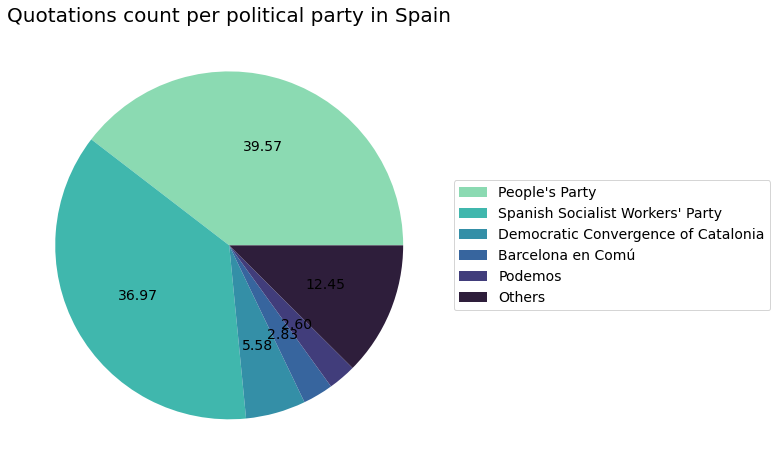 |
We choose the parties with the most quotations for each country. Hence we will consider the Christian Democratic Union (Germany), Democratic Party (Italy), Socialist Party (France), Civic Platform (Poland) and People’s Party (Spain).
Comparison per topic
We will now investigate in detail the correlations between the sentiment of the politicians of the selected parties for some topics. For each of these, we present the overall count of number of quotes per political party and within each political party how many are neutral, positive and negative.
Additionally, we also show how the sentiment evolves in time in these countries and put them side by side to look for any correlations.
Immigration
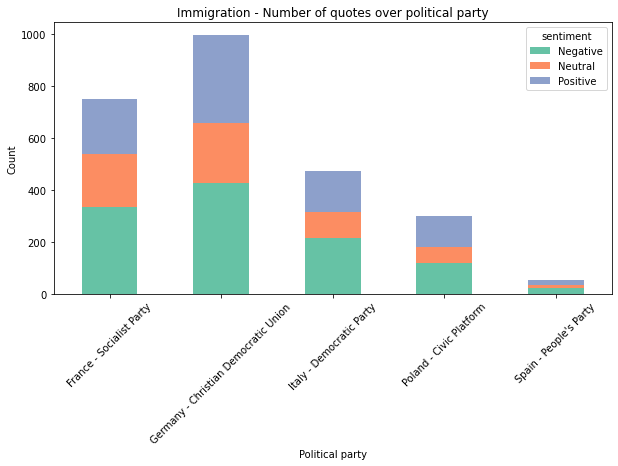
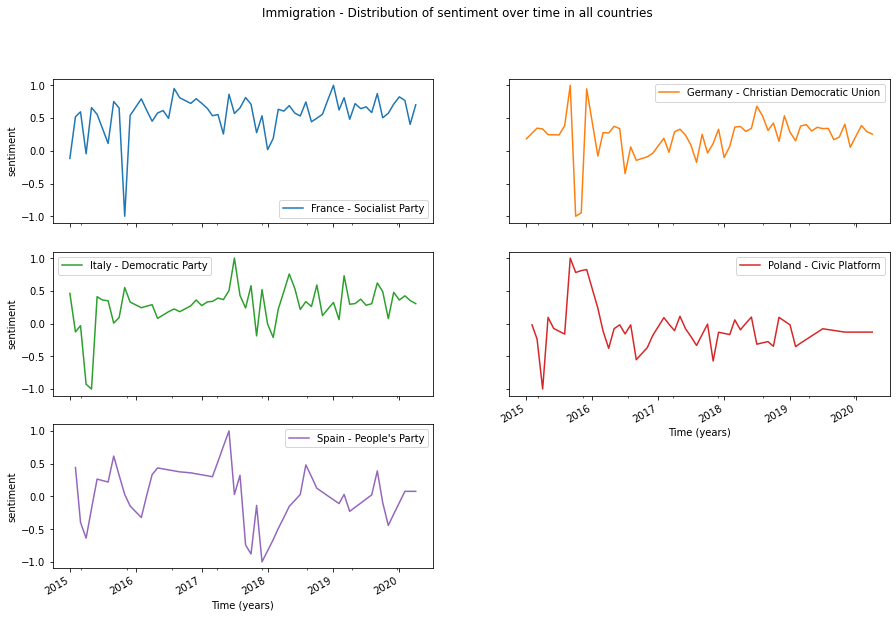
Looking at the plot, we can notice that both Germany and France have some overlapping time when there is a high negative polarity corresponding to the month of January 2016.
What happened in January 2016?
During New Year’s celebrations in Cologne in 2015 many women were assaulted by young men “who appeared to be of Arab or North African origin”, this caused a high wave of criticism against Germany’s large refugee population. Politicians in France, interestingly, also were heavily criticising what had occurred in Germany.

References:
Israeli-Palestinian
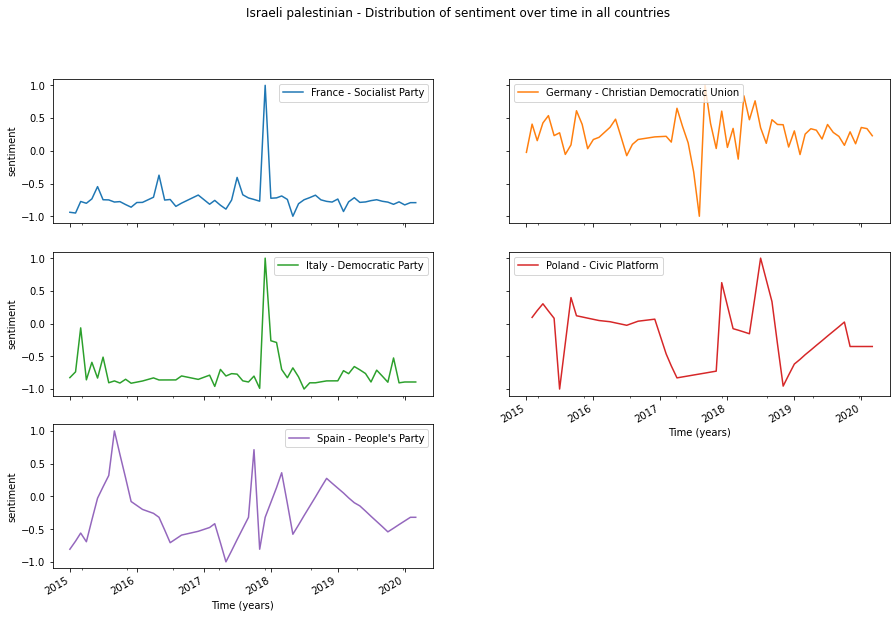
We can see that there are positive peaks in all countries for December 2017. This can be attributed to the US recognised Jerusalem as Israel’s capital as we know from our previous analysis. All right wing parties show a positive common opinion on these agreements.
Other topics
For the other topics there are no clear comparable events we can see in the plots. One reason is that we have a lack of data which makes it difficult to compare the countries.
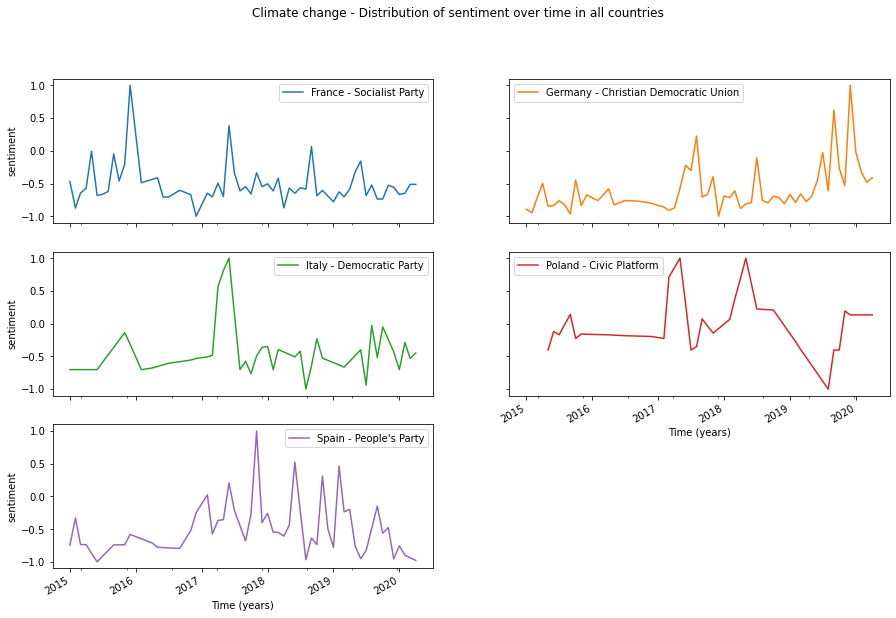
How do the important politicians of the right-wing parties position themselves over the same topics?
Who are the most important right-wing parties?
We chose the most popular right-wing party of each country we wanted to analyse. Except for Spain, there does not seem to be any “relevant” Spanish right-wing party. Only a few far-right partys, which do not appear in the dataset at all or in the case of “Vox” only with a handful of quotes. Hence we chose Spain’s center-right party instead.
We will consider the following parties: Lega Nord (Italy), Alternative for Germany (Germany), National Rally (France), Law and Justice (Poland), People’s Party (Spain).
In order to compare the prominent right-wing politicians, we look at the most quoted politicians of each party and choose the first one, since they are the publicly most present member of their party.
Our analysis showed that the most important speakers are the following:
- Lega Nord: Matteo Salvini
- Alternative for Germany: Frauke Petry
- National Rally: Marine Le Pen
- Law and Justice: Mateusz Morawiecki
- People’s Party: Miguel Arias Cañete
How do these right-wing politicians talk about the selected topics?
Polarity of right-wing politicians in a radar plot
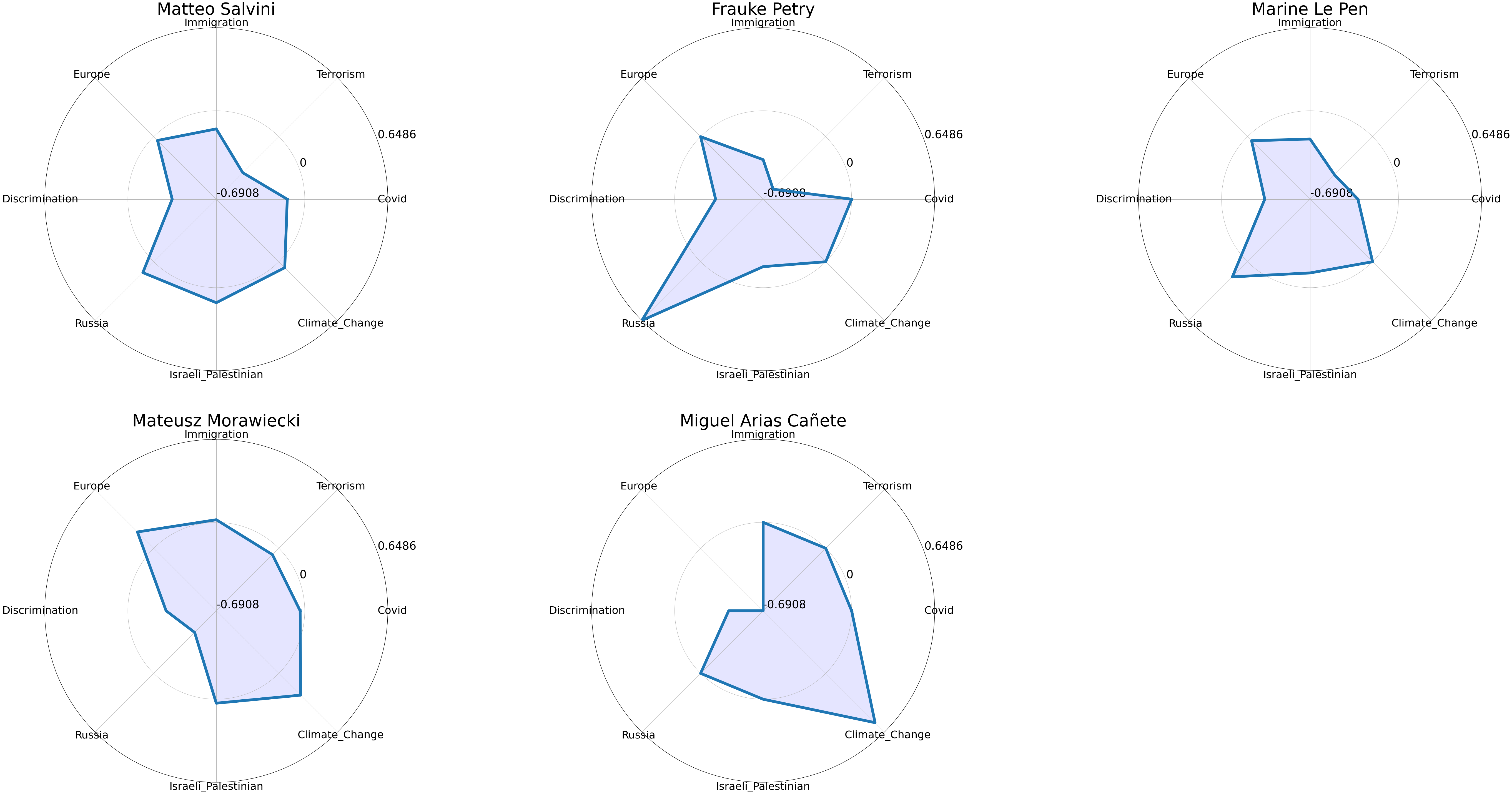
Interpretation: Differences between right-wing politicians from different european countries
- Miguel Arias Cañete
- he was European commissioner for energy and climate action, hence his highly positive opinion on climate change makes sense.
- there are no quotes on most topics, only one on Europe and one related to discrimination. Therefore we can’t interpret much of him.
- due to a lack of data for other politicians we can neglect Spain in this analysis.
- Frauke Petry
- unfortunately for Frauke Petry the quotes are concentrated on the topics of immigration, terrorism and discrimination and for the other topics we have almost no quotes. Although this focus on the immigration topic could make sense, since during her time as the leader of her party this topic was the most important topic of her party, following the “immigration crisis” in 2015, and is the reason for the party’s success in Germany.
- Difference between Mateusz Morawiecki, the Polish prime minister and the only right-wing politician actually being in government in the countries we considered, and the other right-wing politicians
- while the other right-wing politicians are quoted in general more positivly on Russia, Mateusz Morawiecki’s quotes on Russia are very negative. Poland, due to its proximity to Russia, its history and the events in Ukraine feels threatened. (“Once Nord Stream 2 is built, Putin can do with Ukraine whatever he wants, and then we have potentially his army on the eastern border of the EU”).
- Mateusz Morawiecki is, according to the average polarity score, more positive on the topic EU than the other right-wings. If we look into the quotes, they are mostly Brexit related and mostly in favour of keeping Britian in the EU (“So let’s make sure we hook London to the continent.”). While when looking into the quotes of e.g. Matteo Salvini, we get sentences like: “The enemy is no longer the south and Rome but external enemies, in particular, the European Union and immigrants”.
- Matteo Salvini and Mateusz Morawiecki are positive on israeli-palestinian topic, while Marine Le Pen and Frauke Petri are negative
- In this case the quotes are unclear. For Marine Le Pen e.g., they are only loosly related to the topic via mentioning terms like islam, Israel or the middle east. While for Matteo Salvini e.g. the quotes are related to the topic, but it is still difficult to decide what a positive or negative quote would be. Is a quote in favour of Israel a positive quote? So the topic is not well formulated in this case.
-
About Terrorism is talked in a more negative language (negative score). The quotes are mostly related to terror attacks and ISIS. So it does make sense that most European politician have a negative opinion about terrorism.
-
Also immigration is a generally negativly spoken topic, as one would expect from right-wing politicians. The exception seems to be the Polish prime minister Mateusz Morawiecki. But if we look at the quotes, the positive quotes are mostly talking in a positive way about Polands/European immigration policy (wishes).(“An ever greater number of countries is becoming convinced that the best solution is not to forcibly relocate refugees [within the EU] nor to impose fines on countries that refuse to accept them, but to expand our collaboration to help those countries which are the source of the refugee flows to Europe, as well as to harden the external borders of the European Union,”) This also shows that the average score positivity can also be flawed, especially if there are not many quotes or it can be misleading if the general language is positive, but the actual meaning is opposing a position.
- Covid would be an interesting topic, but unfortunately, since it only appeared at the end of the examined time period, there are almost no quotes by right-wing politicians. During the beginning of Covid, the oppinion of a non-government European politician from a smaller party was probably not important enough for the “New York Times”.
Compare right-wing politicians to the heads of the government
Finally we want to compare the opinions of right-wing politicians to the opinion of the leading politician in that country. We consider Italy (Matteo Renzi), Germany (Angela Merkel) and France (Emannuel Macron).
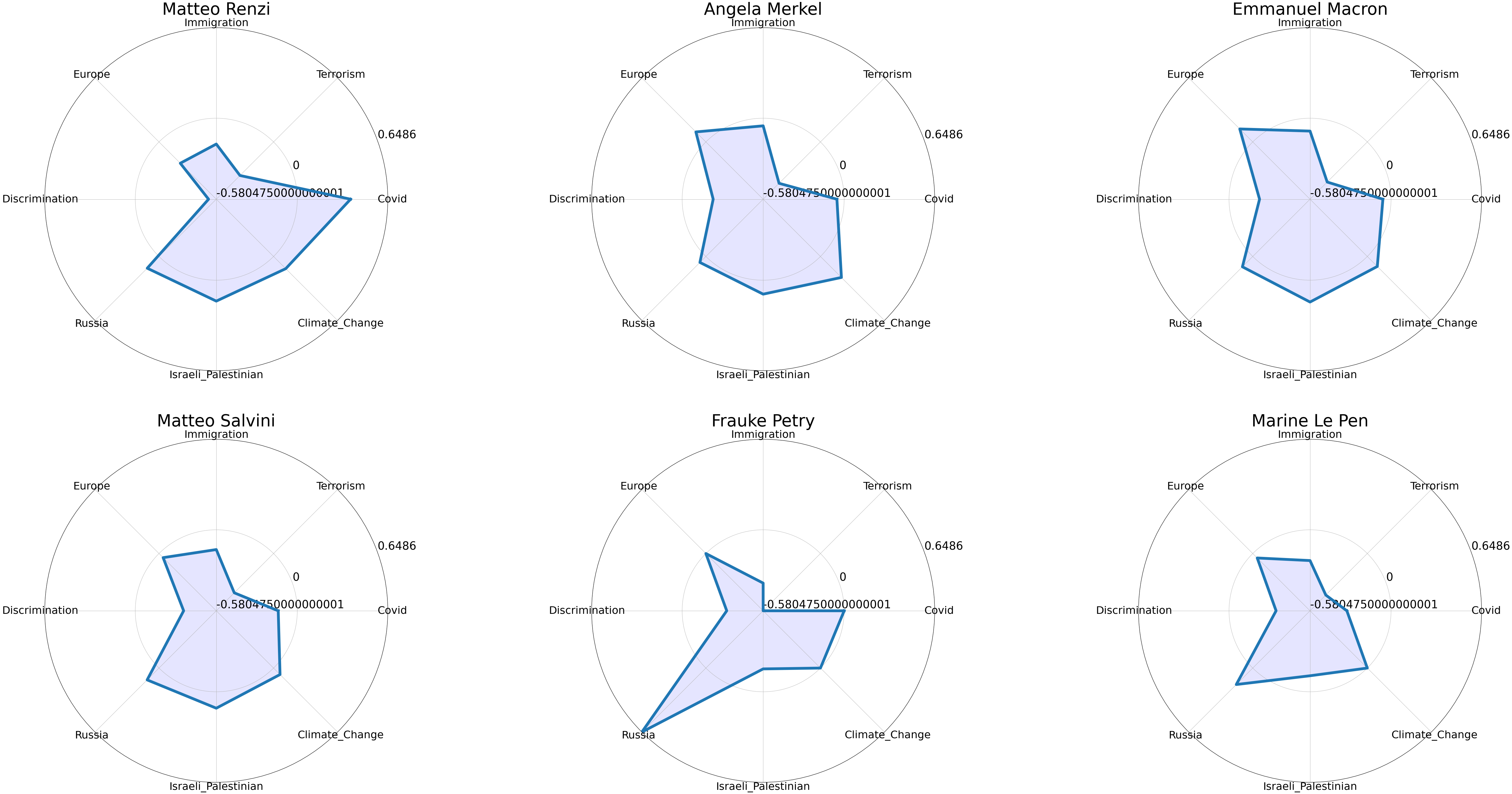
In all considered countrys right-wing politicians talk more negativly about immigration than the politicians in government positions in the same country.
Also the heads of government seem to be closer on the considered topics.
Le Pen & Petry are closer to Russia than Macron & Merkel:
Marine Le Pen & Frauke Petry went to European right-wing meetings hosted by Russia and Le Pen even got funding for her party from a bank close to the Russian government.
For Frauke Petry there is again just one positive quote, but for Marine Le Pen the situation is more clear and is also supported when one would look at individual quotes.
In general, we have a far greater amount of data for globally more known politicians than the right-wing politicians.
References:
What can we conclude about it?
- Generally the same topics are relevant in the different countries. But their importance differ due to individual factors. These factors often depend on the geographical location and particular events happened in each country. As an example, immigration was the hottest topic in Italy, due to their closeness to North Africa and to the importance of far right parties.
- Normally the parties have the same opinion, except for some specific cases in which one party disagrees. One explanation could be that the opinions in one party differ quite much and therefore it is difficult to get a unique point of view.
- Specific right wing politicians showed individual differences depending on their respective situation. But in many cases, for example for immigration, they indicated a common opinion.